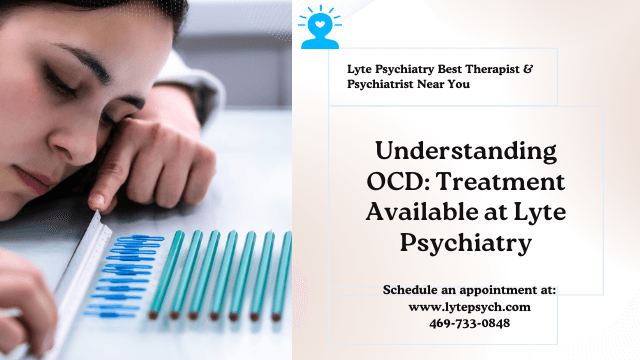Mon Jul 29 2024
Understanding Obsessive-Compulsive Disorder & Its Treatment Available at Lyte Psychiatry (Top Psychiatrist and Therapist Near You) Best Adults and Adolescents Therapist and Psychiatrist Near You, Dallas, TX

Understanding Obsessive-Compulsive Disorder & Its Treatment Available at Lyte Psychiatry (Top Psychiatrist and Therapist Near You)
Obsessive-Compulsive Disorder (OCD) is a chronic mental health condition characterized by intrusive thoughts (obsessions) and repetitive behaviors (compulsions) that an individual feels compelled to perform. OCD can significantly impact a person's daily life, causing distress and impairing functionality. Understanding OCD and seeking appropriate treatment is crucial for managing symptoms and improving quality of life.
What is Obsessive-Compulsive Disorder (OCD)?
Obsessive-Compulsive Disorder is a mental health disorder involving persistent, unwanted thoughts (obsessions) and repetitive behaviors or mental acts (compulsions). These obsessions and compulsions can vary widely among individuals, but common themes include:
Contamination fears: Excessive concern about germs, dirt, or illness.
Symmetry and orderliness: A need for objects to be arranged in a particular way.
Doubt and uncertainty: Repeatedly checking things like locks or appliances.
Forbidden or taboo thoughts: Intrusive thoughts related to aggression, sex, or religion.
Causes and Risk Factors of OCD
The exact cause of OCD is not fully understood, but several factors may contribute to its development:
Genetics: Family history can increase the risk of developing OCD.
Brain Structure and Functioning: Differences in the brain's structure and functioning, particularly in areas related to impulse control and behavior regulation, may play a role.
Environmental Factors: Stressful or traumatic events can trigger the onset of OCD in susceptible individuals.
Personality: Certain personality traits, such as a tendency towards perfectionism, may increase the risk.
Symptoms of OCD
OCD symptoms can range from mild to severe and often include both obsessions and compulsions:
Impact of OCD on Daily Life
OCD can severely impact daily life, interfering with work, school, and personal relationships. The compulsive behaviors can consume significant amounts of time, leading to procrastination, avoidance, and decreased productivity. The distress caused by obsessions can lead to anxiety, depression, and isolation.
Treatment for OCD at Lyte Psychiatry
At Lyte Psychiatry, located in Dallas, TX, we offer comprehensive treatment options for adults and adolescents struggling with OCD. Our team of top psychiatrists and therapists uses evidence-based approaches to help patients manage their symptoms and improve their quality of life.
1. Cognitive-Behavioral Therapy (CBT)
2. Medication Management
For some individuals, medication can be an essential part of OCD treatment. Selective Serotonin Reuptake Inhibitors (SSRIs) are commonly prescribed to help reduce the intensity of obsessions and compulsions. Our psychiatrists at Lyte Psychiatry carefully evaluate each patient's needs and monitor their progress to ensure the best possible outcomes.
3. Combination Therapy
A combination of CBT and medication often yields the best results for treating OCD. By addressing both the psychological and biological aspects of the disorder, patients can achieve more significant symptom relief and improved overall functioning.
Seeking Professional Help at Lyte Psychiatry and Schedule an Appointment Today (Affordable Therapist and Psychiatrist Near You)
If you or a loved one is struggling with OCD, seeking professional help is the first step towards recovery. At Lyte Psychiatry, we are dedicated to providing compassionate, expert care for individuals with OCD and other mental health conditions. Our team of top psychiatrists and therapists in Dallas, TX, is committed to helping you achieve lasting improvements in your mental health and overall well-being.
To Schedule an appointment. Click Here
To see our services. Click Here
Call us if you have questions at 469-733-0848
FAQ
Q: What is the success rate of OCD treatment at Lyte Psychiatry?
A: Our comprehensive approach, combining CBT, medication, and family support, has shown a high success rate in reducing OCD symptoms and improving patients' quality of life. Each treatment plan is personalized to meet the unique needs of the individual.
Q: How long does it take to see improvement with OCD treatment?
A: The timeline for improvement varies depending on the severity of symptoms and the individual's response to treatment. Many patients begin to see improvement within a few weeks to a few months of starting treatment.
Q: Is medication always necessary for treating OCD?
A: Medication is not always necessary, but it can be very helpful for some individuals. Our psychiatrists will work with you to determine the best treatment plan, which may include medication, therapy, or a combination of both.